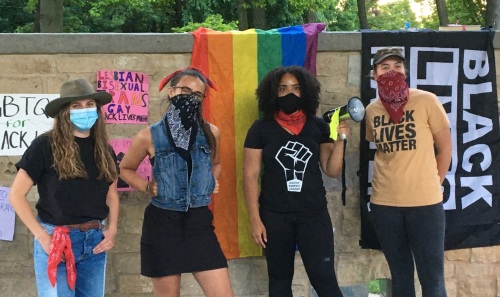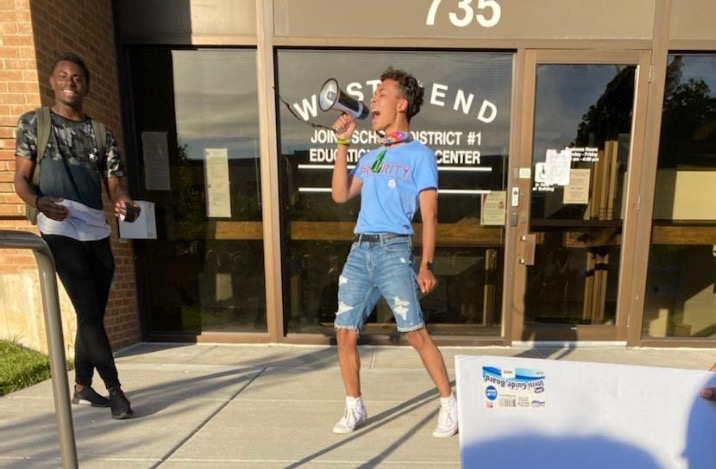By Elena Chamberlain, Current Staff
Former West Bend students have started a group that advocates for racial justice in both the community and school district.
West Bend Students for Change is composed of seven individuals, with the majority being BIPOC (black, indigenous and people of color). They are all deeply invested in change at the West Bend School District because they either noticed or experienced racial injustice at the schools and desire to make it better for incoming students.
The former students began the group this summer with the thought that they would piggyback off of the Black Lives Matter movement happening all over the country, but soon realized that it would be better to redirect their efforts toward the schools.
“We moved the focus to the school district and how we can make a change there,” said Jae Williams, a BIPOC leader in West Bend Students for Change.
This group already requested multiple changes from the West Bend School District as part of a public march they organized in June. More than 100 people walked from Regner Park to the district office to deliver 10 demands. Speakers at the event included Wisconsin Senator La Tonya Johnson, several West Bend alumni, and the organizers, who explained the reasons behind their demands.
The district’s response was posted on their website for the entire community to access. The district highlighted several initiatives in recent years designed to address racial injustice.
In addition, Jennifer Wimmer, the new West Bend School District superintendent, asked to meet with the group over the summer to create an action plan for staff training.
“We discussed efforts by the district to implement equity training in the past as well as upcoming plans for staff professional development around equity and race,” Wimmer said.
In August, most staff participated in training related to the district’s Diversity, Equity, and Inclusion effort.
Wimmer wants to meet with the group again to discuss more training about issues stemming from racism for staff and students in the district.

From left: Olivia McClain, Alina Prahl, Jae Williams and Lindsay Kramer prepare to speak at Regner Park before marching to the West Bend School District offices with their list of demands. Photo courtesy of Prahl.
There are many issues that this group brought up in their demands for the district. This list included previous lack of response to racism by administration and staff, lack of BIPOC faculty, and lack of representation in the books and lessons.
West Bend Students for Change is composed of high school graduates, but not all graduated from the West Bend School District. Jae Williams spent thirteen and a half years in the district but recently graduated from Riverside University High School in Milwaukee. Williams says her experiences at West Bend schools were extremely traumatic. The alleged lack of response to racism from the district forced her to leave.
“Absolutely nothing was done about it, all the way from just staff and aides to the administration failing to act at all,” Williams said. “Fall of my senior year, I just had to leave because racism got so bad.”
At Riverside, the majority of her classmates were black. Her experiences in Milwaukee were so different from those in West Bend, with both teachers and students being more diverse, that Williams cried on her first day.
Looking back on her 13 years in the West Bend School District, Alina Prahl, leader of the West Bend Students for Change group, realized that she never had any BIPOC teachers.
“I never had a non-white teacher,” Prahl said.
This issue seemed to have a pretty clear solution, until she realized that bringing in non-white teachers wouldn’t necessarily be the solution. She believes that having a more inclusive staff would only show diversity on the surface, instead of educating students and staff on racism and trying to solve the root problems.

Olivia McClain and Alina Prahl, both members of West Bend Students for Change, protesting in Milwaukee this past summer. Photo courtesy of Prahl.
After noticing that their leadership was also majority white, West Bend Students for Change realized they needed to lead by example. The group invited more BIPOC to be leaders, and now has a leadership board dominated by BIPOC. Each individual has continued to educate themselves and become better allies.
“It was sort of wrong of us to be organizing with mostly white folks and so we learned and changed,” Williams said.
The same can happen when it comes to class content at the West Bend School District, according to the group.
Although she believes that the curriculum can always be improved, social studies teacher Nicole Mooney says that global studies and AP World History, the two classes she teaches, encompass the impacts, achievements, and oppression that BIPOC have endured throughout history.
“We try to address stereotypes and ethnocentrism,” Mooney said.” We read primary sources from BIPOC authors.”
Prahl disagrees.
“Our curriculums don’t accurately represent black or indigenous,” Prahl said. “The fact that we don’t have a diverse faculty is reflective of the kind of environment that the West Bend School District has cultivated,” Prahl said.
One of the major demands of this group is to include training for all staff to help with understanding racial inequality and how to deal with racism in the schools. Mooney believes that this would greatly benefit the entire school community and Wimmer has been trying to improve the training sessions, after meeting with the group this summer.
“I think that diversity training is needed for teachers,” Mooney said. “The vast majority of the high school staff is Caucasian. We need to ensure that we are creating culturally responsive learning environments.”
The group announces their protests and other ideas on Facebook and Instagram, with the username @wbstudentsforchange. West Bend Students for Change has been meeting through Zoom on Thursdays, where they bring up new ideas and plan upcoming initiatives.
(Top image: Mike Wallace, left, and Jaden Carrasquillo speak in front of the West Bend School District offices as part of a march hosted by West Bend Students for Change in June. Photo courtesy of Alina Prahl.)



Thanks- I am taking APES outdoors and upon reflection searched internet for black foresters which reminded me of one of my favorite people Wangarri Mathai. Today’s lesson will include a visit to the forest, some forestry information and the contribution of the Kenyan Wangarri and her contributions to the Green Belt Movement and empowering African Women
Mr. Delain- I am envious of your students and their class today! I’m reading Wangari Mathai’s memoir right now, what a phenomenal figure to learn about.
Elena, I think you’ve done an impressive job shedding light on an extremely complex topic.
To Elena and The Current, thanks for sharing a bit about our work over the summer.
Thanks especially to all our speakers and performers: Senator Latonya Johnson, Ameera Pearsall, Jae Williams, Mike Wallace, Reverend Clarissa Martinelli, Duwayne Davis, Dania Harris, and to everyone who showed up.
We are grateful to be working with the West Bend School District and optimistic that changes will be made to make WBSD a more inclusive and welcoming space for Black, Indigenous, students and educators of color. We hope BIPOC voices are amplified and heard as our community navigates public health concerns and learns to rectify systemic racial injustice.
Jhalia Evans (she/they), Erica Bhatti (she/her), Mike Wallace (he/him), Jae Williams (she/they), Olivia McClain (she/her), Lindsey Kramer (she/her), and Alina Prahl (she/her)